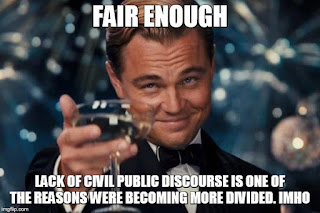The Reality of Enlightenment
Have you ever realized you thought you understood something but you actually understood far less about it? If you haven't, it's a fascinating experience.
This entire class has been a roller coaster for me, presenting all sorts of ideas about how humans actually talk to each other. Both books we've read have been insightful and fun to read, but I can safely say I never actually understood anything until now. I say this because of these past two chapters we read, both dealing with spirituality.
It is one thing to read a book about a topic. It is a completely other thing to actually come away with something profound. I'm starting to finally understand...well, I'm not sure what, but I feel like I'm actually making progress. It's hard to explain, but reading quotes directly from the Dalai Lama...it's one thing to know who a person is. It's another to actually understand them.
Reading this back I think I'm rambling, but honestly it's because I'm floored at the ideas and implications presented. Yes, we need empathy, yes, we need compassion, but hearing it directly from spiritual masters, people who dedicate themselves to the study of spirit...I think I'll be re-reading both chapters, but for now I have more to think on, especially the quote from Thich Nhat Hanh "Speak truth, but not to punish." Be active, but not actively hostile.
I don't have questions for my classmates, I would just like their reactions, what they took away from these chapters if anything.

I think the phrase "Speak truth, but not to punish" is the most impactful quote that I read in this book. From our discussion on Tuesday, I think many people felt the same way. We always encourage thoughts, true thoughts, and attack those who use ad hominem arguments and such, but when does truth become something dangerous? We all like to think that we want the truth and nothing but the truth, but the truth may actually hurt us more than if someone had maybe told a little white lie. I know this isn't the point of the chapters, but I just think the idea of truth as a punishment is fascinating. What if lying wasn't a thing? Would our desensitization to event be different? Would we be more angry or happier? If truth weren't a punishment at points, I just wonder how impactful it would be.
ReplyDeleteThis class really helped me to not be so "afraid" of public discourse. Before this class when I heard "public discourse", my brain just instantly screamed "That means politics and political discussions equal bad" (okay, not "bad", but our political climate is pretty charged and it's hard to have an opinion if you have someone who pulls up example after example to counter it). Instead of focusing on the issue at hand, I focus more on how someone is talking (checking for any fallacies in their speech), actively listening to someone instead of rehearsing my side of the argument in my head, and knowing when to push/pull/advocate. I'm not saying that when there are arguments going on in the comment sections of my social media, I go in and see if I can play mediator (I know better than to offer my two cents when absolutely no one asked for it). Public discourse has helped me see past the mudslinging and helps guide me on how I can (hopefully) improve the polluted public sphere.
ReplyDeleteI thought this course was very interesting. As a Professional Writing and Emerging Media student, this was a new course for me. I was nervous at first, but I have found this course to be very helpful and insightful for my future career. I was intimidated by the words “public discourse” when I first signed up for the class. After listening and partaking in class discussions, as well as reading the two books for this course, I have become more comfortable and knowledgeable in this side of the English department. I also found the following quote from Thich Nhat Hanh interesting: “Speak truth, but not to punish.” I think this quote gives readers a new perspective on how one could respond to different discussions.
ReplyDeleteI'm used to talking about all the issues our public discourse has in previous classes, but I never really got advice about how to deal with the issues or actively combat it. So, a lot of my classes felt like a repeating mantra of "old white man bad, power imbalances suck, no seriously look at how much they suck dude." Which, yes, I agree with, and I think this class definitely also echoed this theme (not saying it shouldn't have), but I appreciated that there seemed to be more structure and guidance about understanding how we got here and what might be done about it. The last book we read (I'm Right and You're an Idiot) especially was interesting to me--I enjoyed reading it overall and thought it was really helpful.
ReplyDeleteThis course was really interesting. I am used to talking about some of these issues. I am an anthropology major on top of being an english rhetoric and writing major so public discourse is something that I have been studying without even realizing it, especially in my projects where we analyze a situation like a road being built through a protected reservation and what the local opinions are vs the governments opinions vs the company's and it is interesting to learn that I have been analyzing public discourse all along lol. not something I would expect from anthropology but aye, I will take it. reading both of our books for the semester was fun and a learning experience for me, i bought our second book but not the Postman book but I might try and find a copy from thriftbooks or something for my future office
ReplyDelete